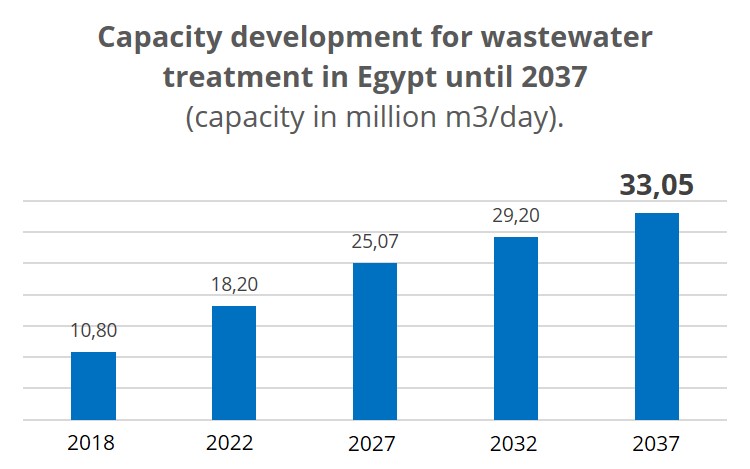OPTIMISING EGYPT’S WASTEWATER TREATMENT PLANTS
The growth of Egypt’s population and the increasing water consumption lead to a higher energy demand for water supply and disposal. The energy costs are a central cost factor in wastewater treatment. Due to decreasing subsidies, they are expected to rise in the near future.
Inefficient technologies and processes at existing wastewater treatment plants also cause rising CO2 emissions. Furthermore, the availability of ground and surface water will decrease. The same is expected for nutrients like nitrogen and phosphorus for agricultural fertilisers.
If the current situation does not change, the availability of water, energy and nutrients will deteriorate.
By means of a feasibility study, the project ATLANTIS aims at creating the groundwork for sustainable and energy-efficient optimisation of Egypt´s more than 458 wastewater treatment plants.

OUR OBJECTIVE
The project focuses on the preparation of a feasibility study for the conversion of two existing plants to a resource for water, energy and nutrients or a specific plant design and for a new construction.
For this purpose, the concepts are examined in detail and practice-oriented, necessary measures are derived in cooperation with local stakeholders and staff is trained for sustainable operation in workshops. The feasibility study is to be carried out for two selected wastewater treatment plants in Egypt, which are selected as examples for comparable plants on the basis of a catalogue of requirements.
The study is based on the results from the completed project ENOSIS, which was funded by the German export initiative for environmental technologies.
INTENDED IMPROVEMENTS
- Lowered energy demand of the treatment process through energetic optimisation of the oxygen supply by adaption of the necessary aeration tank volume and the treatment process
- Biogas production from sewage sludge covering the major part of the energy demand.
- Cost savings due to highest process efficiency through automated operating process and resulting reduced energy demand and sludge disposal expenses.
- Integration of renewable energy sources like solar photovoltaic power to generate electricity for the plant supply onsite.
- Conversion of wastewater treatment plants into net electricity suppliers.
- Nutrients recovery of Nitrogen and Phosphorus from treated wastewater effluent for irrigation and fertilisation
- Integration of automated measurement and control technology for optimised plant management
Project partners
![]()
p2m Berlin GmbH
are the consulting engineers of the Berlin Water group, combining engineering and design know-how with 160 years of practical knowledge in water supply and wastewater disposal.

Kleine Solutions GmbH
offers holistic and economic optimisation of wastewater treatment plants and sludge dewatering, specialised in software-based automated operating systems for highest efficiency in process and energy management.

Technische Universität Berlin (TUB)
focuses on environmental process engineering and acts as project coordination and content management. Through its
“Campus El Gouna” in Egypt, it provides reliable and cost-efficient local analyses.

The Holding Company for Water and Wastewater (HCWW)
is in charge of operation and maintenance of Egypt´s water and sanitation infrastructure.
![]()
![]()
German Water Partnership e.V.
is the only network in the German water sector with an international focus and unites over 300 companies, trade associations and institutions from business, science and research.
Supported by


